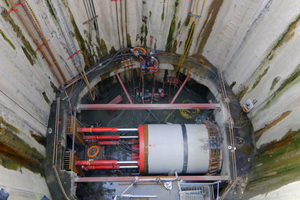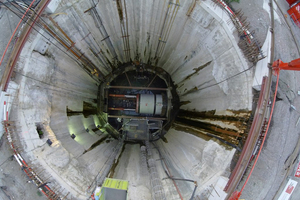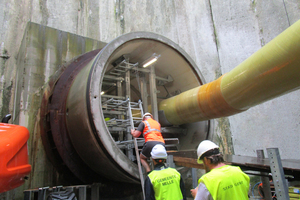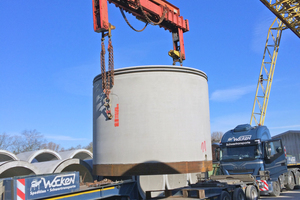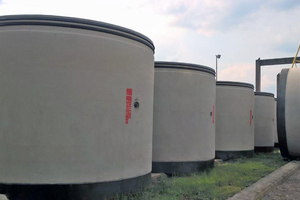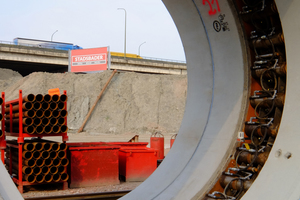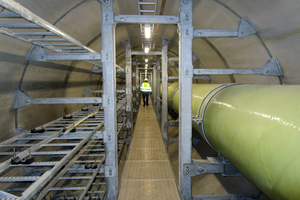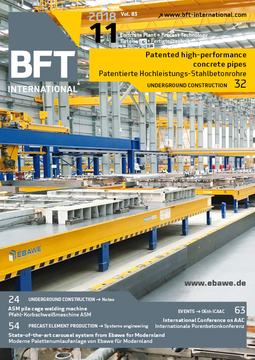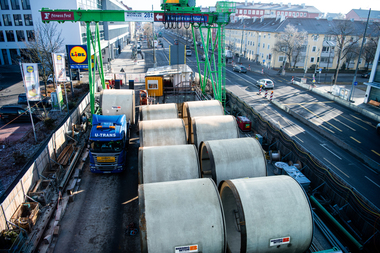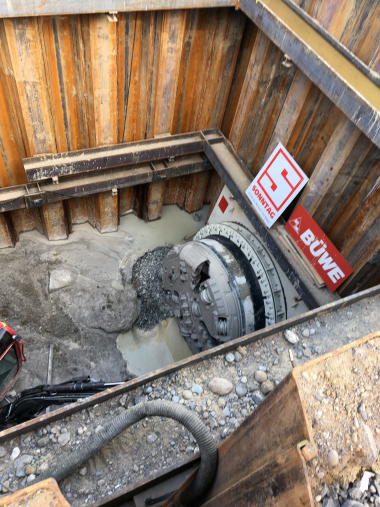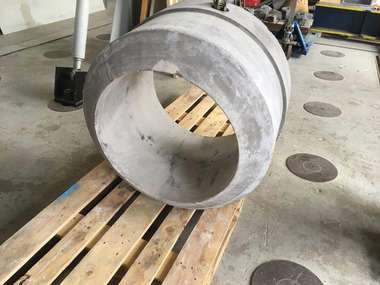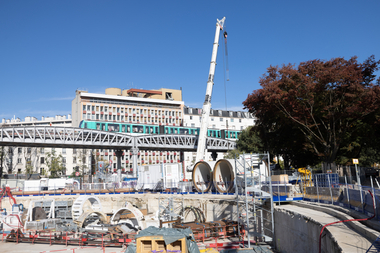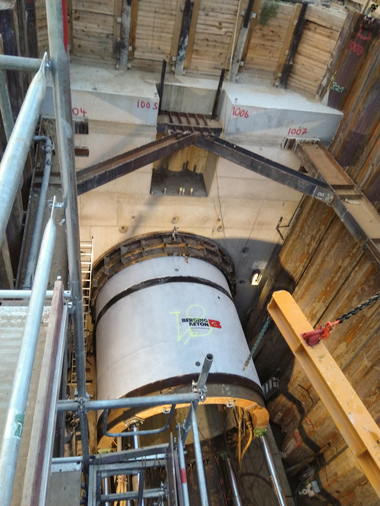Patented high-performance reinforced concrete pipes for Antwerp infrastructure project
As part of the Antwerp Master Plan the most important traffic junction in the Belgium region of Flanders shall be optimized, thus improving the traffic situation. For one of the project – Ijzerlaan – patented high-performance reinforced concrete pipes of Berding Beton were installed over a length of 255 m for the utility tunnels required using the large-diameter pipe jacking method.
About 850,000 inhabitants in and around Antwerp will benefit from the elaborate infrastructure project. The objectives pursued by the „Antwerp Master Plan 2020“ include: to solve the problem of traffic congestions, to increase road safety, and to improve the citizens‘ quality of life. All measures should be implemented by 2023. And they not only concern road traffic, but also public transport, pedestrian and cyclist areas as well as water and canal traffic respectively. The centerpiece of the measures, however, is the completion of the circle of the Antwerp urban motorway ring road, the so-called Oosterweel link, which is divided into five segments, with overall costs estimated at 3.25 billion euros.
The completion means a huge improvement in the overall traffic situation, nevertheless, it also requires extensive construction works. In connection with the infrastructure measures to be implemented, it was required, for example, to build accessible supply tunnels as so-called utility tunnels for all five segments, namely for the installation of drinking water, district heating, gas, electricity and data lines. Future extensions have also been considered, with empty ducts planned.
More than 100 years of experience in underground construction
As an example, one of the first sections realized, the Ijzerlaan project, clearly shows which tasks had to be mastered. For the utility tunnels required high-performance reinforced concrete pipes of Berding Beton were installed here over a length of 255 m using the large-diameter pipe jacking method. The tunnel driving works were taken over by the Belgium Smet Group, which is specialized in microtunneling, among others, and looks back on more than 100 years of experience in underground construction. They had to face two challenges at once: As the supply tunnel runs beneath the Albert Canal, jacking pipes were demanded that withstand the water pressures in a depth of 25 to 35 m, guaranteeing absolute tightness over the projected service life of more than 100 years. Owing to a special geological feature, there was moreover a risk in that the prevailing expansive clays could be activated by the intended earthworks in conjunction with further construction works, hence leading to additional loads and/or earth movements. Therefore, they had to take these special factors into account reliably in both the structural calculations and in the design of the jacking pipes.
The aim was therefore to observe all criteria while ensuring the high quality required. Thanks to many years of experience, combined with the engineering know-how well-known in the market, Berding Beton was able to establish themselves as a partner for the production and supply of the high-performance jacking pipes.
External quality control ensuring „zero defects“ target
In this case, it was first necessary to meet the client‘s general requirements imposed on the jacking pipes. The client requested, among other things, an inside diameter of 3.50 m (DN 3500), an outside diameter of 4.10 m (OD 4100), a minimum wall thickness of s = 300 mm, a minimum overall length of 3 m as well as cast-in sheet steel casing on both sides. The general equipment, furthermore, included a hot-dip galvanized anchor channel provided with a structural verification as standard. The production of the jacking pipes was carried out in accordance with the quality standard DIN EN ISO 9001. Corresponding to the significance of the construction project and in compliance with the „zero defects“ target, the client additionally assigned the engineering office SCRL Seco eubau located in Brussels with external quality control. Therefore, every jacking pipe was already individually tested from the production to the delivery at the production plant.
In addition, the contractor made additional demands on the jacking pipe, such as increasing the number of bentonite nozzles, injection pipes in the penetration area of the shafts, increasing the permissible driving forces, optimizing the safety margins, improving the robustness of the intermediate jacking station, additional externally mounted ball-headed anchors for improving handling at the construction site and a delivery frequency of at least 35 jacking pipes (weighing 30 tons each) per week, which should be installed 24 hours a day, seven days a week.
Innovation protected by patent
For the professional implementation of the demanding contract, Berding Beton developed exactly fitting high-performance jacking pipes in close consultation and cooperation with the Smet Group. In this regard, they also considered all impacts to be expected on the pipe, such as internal and external chemical attacks, the wear and aging factors, or other potentially extraordinary loads that might occur during operation. They also attached great importance to realize the required absolute water-tightness (at pmax = 3.5 bar) over the entire service life of at least 100 years.
Corresponding to the specifications of the client and contractor, Berding Beton finally manufactured high-performance reinforced-concrete jacking pipes of DN 3500/4100, which are equipped with a flexible joint with welded omega-shaped profile made of stainless steel. The joints being fully welded after jacking meet the requirement for durability and 100% tightness. In addition, they will be able to follow the mechanical ground movements of the pipe string to be expected in future at any time, without even losing their tightness function to some extent. The forces acting on the innovative pipe joint design were calculated carefully, being verified by independent tensile tests at an officially recognized material testing institute. This technical solution, developed by Berding Beton, soon turned out to be an innovation worth protecting, so that this system has been protected by patent meanwhile.
All supply tunnels installed without customer complaint
After a successful and smooth implementation and after having proven its worth in practice, subsequently, this type of pipe was used for the four additional reaches of all segments. Depending on the reach, various challenges had to be mastered during the driving process, such as geological particularities, changing water levels, bottom heaves or the underpass of the motorway ring road, the Antwerp city train (Premetro) or the Groote Schjin river. In the meantime, the utility tunnels of all segments, summing up to a total distance of about 1.2 km, have been installed without any customer complaints.
Even after commissioning, the tunnels remain accessible for maintenance, inspection, replacement or extensions. In order to prevent moisture from forming in the tunnel, it has been equipped with a ventilation system, to prevent an unwanted formation of condensation. All parties involved expressed their pleasure about the successful implementation of this exciting construction project. Far beyond the borders of Belgium, tunnel experts from across the EU had a look at this construction site. From the feedback it can be expected that the convincing overall technology will be used again in the context of demanding projects. This not ordinary success was only possible because of the cooperation in partnership between the client, the planning engineering office, the contractor and Berding Beton.

